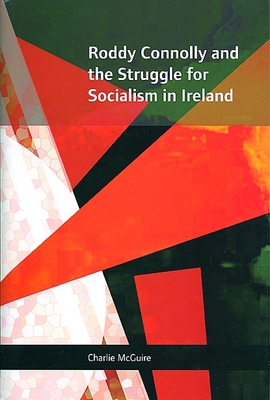Roddy Connolly And The Struggle For Socialism
Adrian Grant reviews Roddy Connolly And The Struggle For Socialism In Ireland by Charlie McGuire, Cork University Press, ISBN 978-1-85918-420-2, €49/£33 hbk

THIS IS the first biography of Roddy Connolly, son of James Connolly and a major player in the development of Irish communism and socialist republicanism in the inter-war period.
The book is largely based on Charlie McGuire's PhD thesis and is a welcome addition to the under-developed historiography of radical Irish labour.
Unfortunately Connolly neglected to write his own memoirs, which leaves a lot of lot of work to be done in order to understand the motivations behind his political activity and strategy. Thankfully McGuire goes some way to providing us with a fully detailed account of Connolly's political life (there is little mention of his personal life but in an academic study of Irish socialism this is hardly necessary).
Roddy Connolly fought in the Easter rising as a teenager and spoke to his father for the last time inside the GPO. After being released from internment he again became active in the revolutionary movement that was in the process of being created.
He initially worked with the republican movement but after spending some time in Scotland he returned to the revolution with a political outlook that was a mixture of his father's socialist republicanism and Bolshevism. From this point onwards he threw himself wholeheartedly into communist politics.
As leader of the new Communist Party of Ireland (CPI) he was the first politician to publicly oppose the Anglo-Irish Treaty and supported the republicans throughout the civil war.
He was active in communist politics throughout the 1920s and 1930s when he tried to seek accommodations between the IRA and communism. This was frustrated by the Communist International's (Comintern) courting of Jim Larkin during the 1920s and the contradictions inherent in Soviet policy during the inter-war years.
Connolly's politics moderated in later years when he joined the Irish Labour Party which was a proudly social democratic party that was often at variance with his views on republicanism in particular. He later became a Labour TD and a senator in the 1970s and was in favour of various Labour/Fine Gael coalition plans. He died in December 1980.
McGuire's research is extensive and original. The only other historians to treat Connolly with any significance have been Emmet O'Connor and Mike Milotte.
This book is extremely valuable to the study of radical Irish politics and is an interesting insight into Connolly's political life. The author is at times a little too uncritical of his subject but this is of minor significance in such a fine study of the period.
It is refreshing to read an Irish history book that refuses to adhere to the conservative, relentlessly negative line pedalled by historians of the same period such as Richard English. To quote McGuire on the issue of conservative historiography:
"Most historians who write on the events and the times in which Connolly was active do so without reference to his activities or those of the left in general. This is because these historians proceed from conservative standpoints for the most part and are largely uninterested in the contribution made to Irish history by those of a more revolutionary outlook. This in turn brings into serious question the history they write and the conclusions that they reach. An examination of Connolly's career assists those historians who wish to challenge these conservative interpretations because it illuminates the thread of radicalism that runs throughout twentieth-century Irish social and political history and, in so doing, alters appreciably the latter's overall appearance."
McGuire claims he started writing "free from these revisionist parameters of pre-ordained failure". It is interesting to note this backlash against the rut that some of Ireland's most prominent historians have settled into and it is to be welcomed and encouraged.
This is not the book for anyone interested in an easy read about Roddy Connolly, but as an academic study it is extremely valuable. For anyone interested in an alternative view of Irish history, this book would be a good place to start.
Connolly Association, c/o RMT, Unity House, 39 Chalton Street, London, NW1 1JD
Copyright © Adrian Grant

